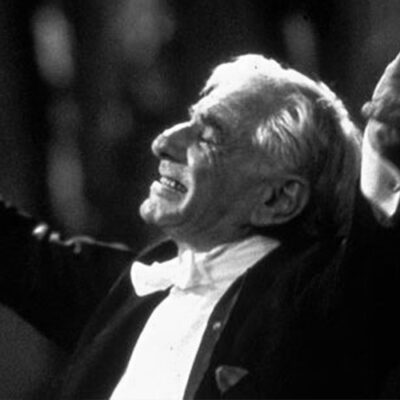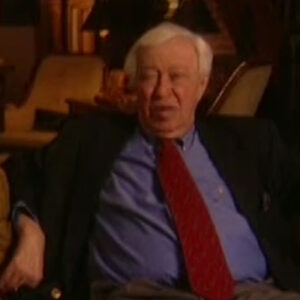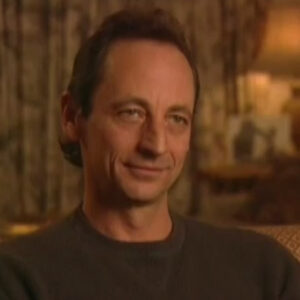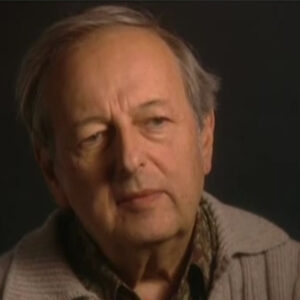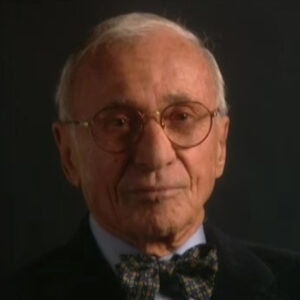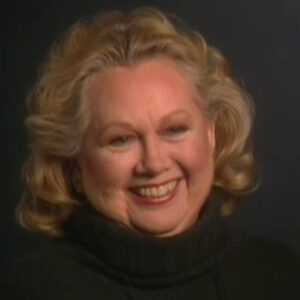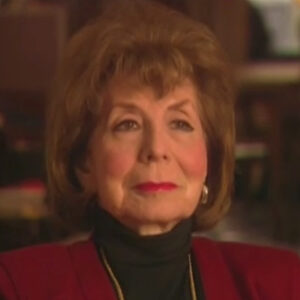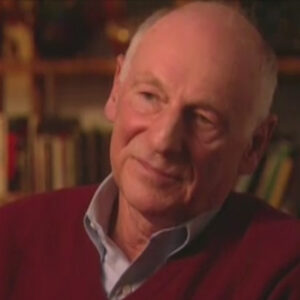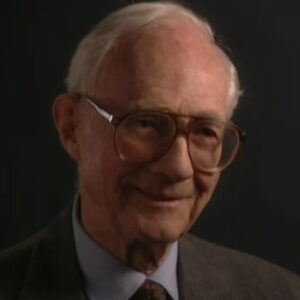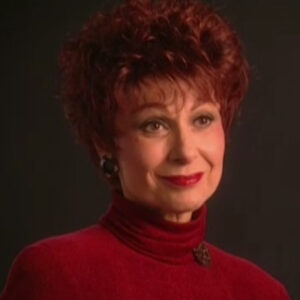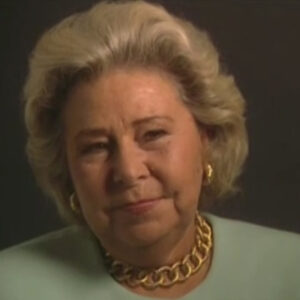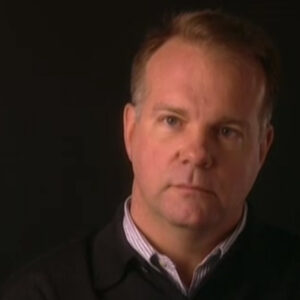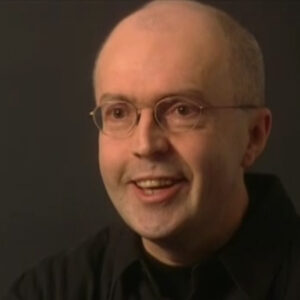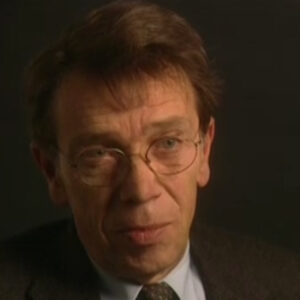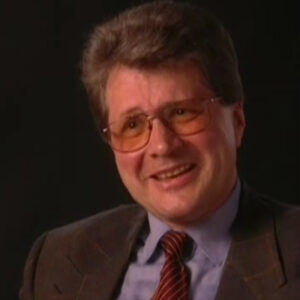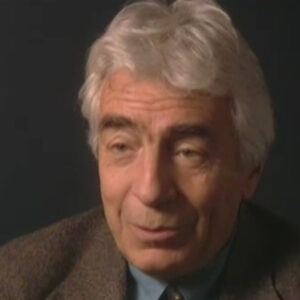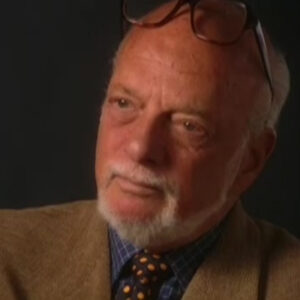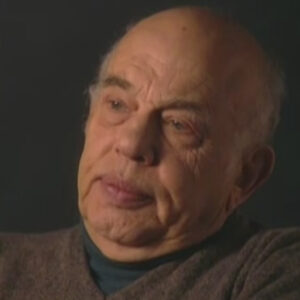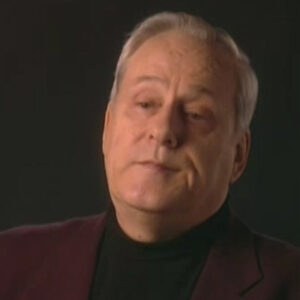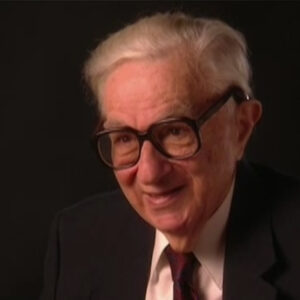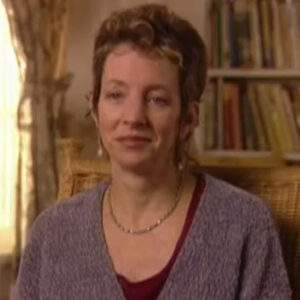Speaker I think the thing that as a composer I’ve always felt so strongly about was Lenny is very similar to me. He had a lot of trouble composing. First of all, it was very difficult for him. Everything else was very easy for him and a lot of his music. In fact, if you if you listen to it, you can trace it back to a short piano piece as he wrote his anniversaries, like his serenade for violin strings and percussion is almost entirely composed of of the combining of these short pieces or the Jeremiah Symphony or other pieces. And I think that on composing was one of the few things that Lenny was a little frightened of. And it is a frightening thing to compose. But I think one of the reasons he was frightened is because Lenny wrote melodically, basically tonally, although he used all procedures and in a time where that was very unfashionable. And when you’re writing for your friends, you write these little piano pieces, you relax and you enjoy it and you write something very beautiful. And then suddenly when you have to write the New York Philharmonic and, you know, 2800 people and The New York Times, this barrier sets in. And I think that Lenny, very often. I know he felt very deeply the schism between his progressiveness and his label as a conservative composer had bothered him a great deal. I remember seeing him in tears after a TIME magazine review and saying, you see what they said about me. I remember after he performed my clarinet concerto, which he did the premiere of a nineteen seventy seven. It was really an extraordinary thing because he gave this phenomenal performance. He loved the piece. And a week later songfest was premiered and I went to that and came backstage and went up to Lenny and Lenny. When he saw me said, oh, but my penis is so conservative and I said, your piece is gorgeous, funny that that thing hanging over his head, I think was really very difficult for him. And it’s ironic now because now that Lenny’s gone, the idea of the that aspect of judgment is gone. What I have found, and I think it’s really true of all ages, but especially in this age, we can really see it very clearly, is that music is not judged by the quality of the music, but by the stance it takes in music or say, history. That is, are you progressive, modernist or are you a conservative or are you a minimalist? And if so, do I like those things? And if I don’t, I don’t like what you do rather than is this piece a quality piece so that whatever you write, you can do your very best and write this beautiful piece. But if it’s representing something philosophically that I say a critic or a public or whatever feels is either out of date or wrong or for the time it’s condemned whether or not it’s quality. I remember Samuel Barber telling me that he used to go to performances where Rachmaninoff was premiering his works in Philadelphia while he was a student at the Curtis Institute, and that all the kids would laugh at Rachmaninoff because he was so old fashioned. And we don’t now think that way because Rachmaninoff is gone and he’s no longer therefore representing old fashioned music. After all, Stravinsky came and was written The Rite of Spring and there was Rachmaninoff with these very romantic piano concertos. And I think the same thing is true here, that now that Lenny’s gone, there are no more politics attached to his music in terms of his conservatism or radicalism or modernism or non modernism. It’s simply just his music and it’s doing very well, judged his music. I think the he would be very happy to know that he’s entering the repertoire. As you know, one of the 20th century’s great composers, Shostakovich, was another example of someone who was vilified during his lifetime by composers and the musical establishment. Bartok made fun of him literally in his concerto for orchestra, took a piece of, I think, whatever, the seventh, the Leningrad Symphony, and played it sarcastically on the trombones and with a kind of wah wah laugh, making fun of this, the ludicrousness of Shostakovich. Now we think it just accomplishes a great Russian composer. Interestingly, Bartok played a little bit less after his death and Stravinsky, who ruled completely I mean, absolutely, when I was a youngster and was played all the time, aside from the handful of pieces that have entered the repertoire, played a good deal less. And yet people like Poulenc or Shostakovich or Leny played a lot more. So I think it’s a very interesting thing. The moment a composer is gone, the pieces become important and the quality of pieces and the lasting this and the the real intrinsic worth comes out. And I think that it would have been very satisfying. But I can see the frustration that Lenny went through. And I remember I mean, I don’t read newspaper reviews myself since 1991. I have stopped reading all reviews because I don’t think they’re productive for a creative person to read. But I remember hearing stories of everybody from Brookner on harassed in to great unhappiness. And Lenny was certainly one of those people. I remember it very well.
Speaker It’s very interesting because, you know, certain people in the interviews have talked about many times and the press. But in the sense of, you know, like the maestro, as you’re talking about, is in some sense about the press, about. His work and that it created doubt that on his part, do you think it did create doubt?
Speaker I think it’s very hard. To read something that’s critical and not have it hurt you, especially if you come from the kind of family I came from and Lenny came from, there’s a kind of Jewish family in which you always believe criticism. And every time you criticize, you say they must be right. And I’ve grown up that way, too. I actually ignore the praise and I don’t remember it too well, but I can quote every single thing that was ever said negatively about me. And I know that Lenny was like that. He was obsessive about that kind of criticism. It really got to him, especially when he felt it was unjust, because while he felt it was unjust, he suspected they must be right. It is The New York Times, you know. I mean, we all feel that way. You know, we don’t realize that this is one person who is obviously not nearly as gifted a person as the person who wrote that music in the first place. It’s a it’s a paradox, really, and a very strange one that that words of a single person who went to a concert, even though 3000 people cheered that negative words like that could make somebody so distraught. But I know exactly how he felt and I understand it. All we have to do, by the way, to see the accuracy of all of these reviews is to read a wonderful book by Nicholas Levinsky called The Lexicon of Musical Invective, which has the reviews of the Boston premiere of the Brahms First Symphony, where it was called mechanical music with no melody at all of Schubert, of Beethoven, of Debussy. It’s really quite enlightening. And we can all look at that and laugh now because it’s all over with. But when it’s happening to you and you’re trying and you spend a year or so of your life creating a work and somebody breezily comes in after dinner and judges it without a score or without any real knowledge of that piece, and millions of people all over the world read that judgment. It’s very difficult. And I know I know he bought that and I know it hurt him. And that’s because of that for him. Well, you know, he was a he was one of the luckiest people in the world. And yet he was he had these devils that hurt him. And I think one of them was being taken seriously as a composer. I think he really, really on so upset to hear people say, well, he can write theater music, but he can’t really do anything, you know, in the concert hall of any real worth. I think that that was probably the deepest pain musically that he had been because.
Speaker Of all the flooding, so first of all, we all know that, but it’s pretty clear from his writing that and the pecking order in terms of importance to him. A composer is without a doubt the most important thing as a statement. He says that in the beginning was the note. Yeah, I know I’m beginning and I know of God and something about a things and read that note the you blessing to the divine.
Speaker I mean, I truly think that he thought that that was that was if he could talk about and actually tell me that that right. And all you know, that it was the same thing.
Speaker Well, I know that composing was the most important thing to him. On the other hand, I know how difficult it was and how easy it was for him to conduct and how simple it was for him to look at the score and three days later conduct it and have a cheering crowd and rave reviews. So there was a real problem because it takes so long to write music, you have to isolate yourself. You can’t do it, you know, and do a million other things. And so he thought it was the most important thing in his life. On the other hand, it was very tempting to get the instant rewards you get from being a performer with great facility. A conductor once told me that he really, really worked on my piece. He spent three weeks on it and I thought, gee, I really worked on it, too. I spent three years on it. You know that people don’t realize what it takes to write a piece of music and the time and the effort and the amount of concentrated energy it takes. But I think that Lenny understood and certainly from all his writings and everything he’s ever said to me, that making something from nothing was the ultimate act of creation, and that when he took a Brahms symphony, he was making something from something. And that’s something was written by Brahms and that it was a very different task and one that he could do with much more ease that you seem to be because you’re obviously very familiar with this.
Speaker What was the basis of what was the. So much of the criticism of his music at the time.
Speaker Lenny was very progressive in his programming, and in fact, for 10 years, he did a series with the New York Philharmonic in which he played the music of John Cage, Elliott Carter and every single composer, his musical vocabulary. On the other hand, the way he expressed himself was basically tonal and utilized what we could call the American School of Composing, dealing with rhythms influenced by jazz, a simplicity and directness of expression. And if you want to give that a label, you might say conservative. On the other hand, I think that conservative implies the very opposite of Leonard Bernstein, who was a very radical person in his views, his life, his political views, you know, everything else. And I think that the big problem is modernism, the idea that after World War two, this very strange growth of modernism came through the entire world. And what happened was it was kind of a reaction to Hitler’s condemnation of everything that was modernist, you know, and Stalin’s and that whole idea that that music had to be people’s music. What happened after World War Two is there was an explosion in Europe and all over the world of freedom, we can be as modern as we want. We can say nonsense, we can do anything we want. We are artists and no one will restrict us. And we’re not really speaking to the concert audience. We are expressing ourselves because we are free to do so. Modernism has had its day now and in fact, it’s a very interesting phenomenon. Now I am called a post-modernist, whatever that means, which means I guess only that I’m not a modernist. Lenny Leonie’s music was written in the heyday of modernism, as was, I might add, my early music equally condemned for the same reasons. And in that day, you did not write music that was not serial 12 tone or cagy and experimental. Europe is still under the throes of modernism. Modernism thrives with support, with state support, it’s another irony that while we all want the National Endowment and help, one of the great problems of state supported art is that that then politics can enter and a person can and a whole group of people can get in and manipulate, since audiences are of no concern, what gets commissioned and what gets played. And that happened after World War Two for many, many years. And so critics and and European institutions were promoting this kind of music and having disdain for any music that was not like that. And I find it an interesting paradox that modernism became totalitarianism in music, even though it arose because of the totalitarianism of music, that it became its own, its own rigidity, and that if you didn’t write that way, you were writing bad music and Lenny didn’t write that way. And he never wanted to and he never did. I find that very courageous, of course, because I have seen composers skip around from one language to another, depending upon the fashion. Now that when neo romanticism came in, suddenly a lot of Western composers shunned 12 tone music and jumped to the new romanticism. And when this happened, minimalism, they became minimalist. I think it’s really a sign of a composer’s deep integrity when, though unfashionable as Lenny’s music was, Lenny felt that’s the music he wanted to write and that’s the music he did write about Boulez since his musical specifics.
Speaker And I just something I mean, there are variations of a rhythm and indeed and melody and dynamics and so forth, that that if you could talk about him, about Lennon’s music, with with making specific references to the things that appeared over and over again, I mean, OK, OK, it’s hard to verbally describe a composer’s music because music is non-verbal.
Speaker But I think if I were asked to sort of give a verbal picture of Bernstein’s music, I would say that it was melodic and the melodies usually had a quirkiness about them. For example, he loved to use certain modes while writing rather than the major scale with a raised forth or things like that so that he would get out of the normal scale.
Speaker Writing his harmony was punctuated by, as he used to say, Aaron Copeland, jazz influenced but not jazz harmony by jazz influenced harmony. I mean things like this in jazz because the blue notes of jazz are between the major in the minor third of a chord. Very often you play both notes in a triad and you get this kind of dissonant sound and that’s a jazz sound. It also is an abstract musical sound that can be used in development of music. Bernstein was fond of harmonies that were derived from jazz sounds but used in a totally different manner. His rhythmic pulse was very strongly American.
Speaker We inherited this. It was a very strange inheritance. Igor Stravinsky came to Paris and wrote things like The Rite of Spring and these two other sold out and all these wonderful pieces with mixed meaders and irregular rhythms and meal and all of these composers. Aaron Copland took this back to America and wrote the jazz pieces like his piano concerto and music for the theater, utilizing these mics meters. And then they became part of American vernacular. And as Copland described in his books, The American Rhythm emancipated the eighth note, he calls it, which meant that you could pulse irregularly tete a tete a tete a tete a tete a tete a tete a tete. Whereas the European idea is the broad beat and things happening within the broad beat is very much of the American school of this fast pulse, pulsing eighth notes which give tremendous energy to music. It’s unpredictable. The groupings can be taught at the data that the character that is you can change twos and threes very fast in the European version. You can have rhythmic changes, but they happen at a much slower beat pattern. And this is why European conductors have trouble with American music very often is because they used to bring big broad beats and the American dances along, as Lenny did. With faster thrusts and faster beats, so rhythmically that was the case melodically, as I say, he utilized different kinds of scales in his writing. Harmonically, he was influenced by, shall we say, things derived from jazz, although they didn’t sound like jazz all the time when he used them. And philosophically, I think, which is a terribly important thing, is that he was concerned with getting to his concert audience. I think one of the aspects that we have to look at is does a composer want to speak to the audience in that hall or is the composer interested in speaking to other composers at that time? Many of those other composers who were interested only in other composers understanding their music and have no interest in the people in that hall or speaking to them?
Speaker A Pulitzer Prize winning composer told me that he considers a concert to be a private communication through public means. And my question to him was, why should the public sit there and listen to it? Why should they buy a ticket? And he said, because they should. Because it’s high culture. And I said, but you’re not speaking to them. The language you are speaking is incomprehensible to the ear. It doesn’t matter. Well, I think Lenny didn’t agree with that, and I certainly don’t either. I think one of the things that’s most important to talk about when you talk about composers techniques is what are his aims? And I think Lenny was interested in speaking to the concert audience. He wanted them to be interested in his music and to follow it and then to hear it again and learn more about it. Much as Beethoven or any composer in the past. I mean, when when you listen to a Beethoven symphony for the first time, you are immediately drawn into the world of Beethoven. It’s visceral and you hear things that make sense. But you’re not sure of everything because Beethoven worked a long time on that piece. And every time you hear it again and again and again, you hear the layers and layers of intelligence and feeling that come into this piece. I think that was Lenny’s goal. That certainly was not the goal of many composers in the time. We’re talking about actually, we’re talking about basically middle middle of the century or earlier before that, even to the present. Their goal was to speak to other composers and very often in a language that can only be understood by other composers. When you do this and shut out the audience, the audience sometimes responds by saying, okay, I’m shut out, I’m leaving. And everybody looks bewildered and says, well, you shouldn’t leave. But the answer is, why shouldn’t you leave? I think that the composer has a job to do. And it’s the same job that Mozart, Bach, Beethoven, every Volumnia, even all composers had. And that job is get them interested in your music, say something to them, draw them into the intellectual and emotional arena so that they can begin to appreciate what you really have to say and hear the piece again. And the irony about this highly organized music is that the one thing it did not draw the listeners into was the intellectual arena. Because when you organize music, according to these systems of modernism, actually you can’t hear the organization. Aaron Copland told me that. He said, I can’t hear it. Lenny told me that. He said, I can hear it. I can’t hear it either. No one can. Therefore, what you are doing is you are forcing the audience to listen to 20 minutes of music and not giving them a single intellectual thing to grasp onto. And I think that that was an anathema to him. And it is to me now, that doesn’t mean that your music has to be obvious and it doesn’t mean that you just write something to please the public, which is what happens when people say we’re concerned about the public. The next response as well. Are you pandering? Are you just writing for the public? No, no more than Beethoven or Mozart did. We are writing to speak to people and we want them to listen and we want to engage them. And we we know that they actually voluntarily came to this concert and they don’t have to listen to this piece again. And if I have things I worked a year and a half for that are in this piece of music, I want them to discover these things and you can’t do it. The first time. You must hear a complex piece more than once you layer music and layers require just like an onion. The unpeeling of these layers is the listening of music. And that’s why classical music is so rich. And that’s why he loved it so much. And why I love it so much is because it has these layers. So what he did was write music with these layers and write a visceral, you know, message to the audience. Listen to me. I have something to tell you and gave them structure they could hear the first time in a superficial way and then substructure underneath that was there for them. To find in the future that to me is what a composer is all about, but it was very, very much against the fashion of the day and therefore very condemned. If you didn’t understand something, in many ways, it was thought of as a virtue, obscurity. I’ve read program notes that make no sense at all of pieces. I’ve asked composers about it and they can’t even explain anything about their music because they have no way of really knowing it. I had a student of mine some years ago who wrote this beautiful piece that was very lyrical and traditional, and he didn’t want to go through the parts of the orchestra and correct them because he wanted the errors to be in them, because he was so afraid that his colleagues who thought he was so conservative would dislike the piece unless it had some wrong notes in it. So he didn’t want to proof the notes and make them the notes that he really wrote. And I said, Ray. That’s just amazing. That really is amazing that you wrote a beautiful piece, give it to these people, have the courage to do it. And I think it took a lot of courage and it did take a lot of courage in those days to write music that spoke to people now. Times have changed. And the young composers today, I think through the persistence of people reaching audiences that so we haven’t totally lost. Our audiences are listening to new music that is speaking to them. And we have a whole host of young composers that are healthy outlook in this country that have a healthy outlook to speaking. And I think that they can be grateful to Lenny and people like that that went through the bad times and didn’t change so that the good times could come back. And by the way, that difficult music is still being written. And that’s fine, because as far as I’m concerned, it’s wonderful that people write music for other composers. It’s just that the people that should hear that music should be those are the composers. Everybody should find his audience. That’s that’s a real democracy. That’s what I really like to hear. That is using words like wildlings and keep this.
Speaker It’s like people call the democratization of music, and I don’t think that they are right and wrong, but could you tell?
Speaker Well, one of the great problems of classical music as we know it, is that basically it grew and floured and reached its fullest height in basically Germany, but also Europe, Western Europe. And when it came over to the United States, it came over. And many immigrants that came over from Europe were educated and grew up in this tradition. And it was very much a part of the tradition. My mother my father came well, they were born here, but their parents came over and they were trained musically because that was the tradition. And now things have changed enormously. And I think that what Lenny was interested in doing was taking away the image that classical music is basically music by dead white foreigners and is an elitist art form meant only for wealthy people.
Speaker I think that Lenny felt that that the vitality and beauty of this music should be available to all people and that he could try to make it comprehensible. And I think he fought a noble battle. The biggest problem is that the government has phased out music education and most of the school systems and even the parents of the youngsters going to school now basically have had no classical music education. And so these kids grow up where it is really thought of as an outside thing. But I think he thought he wanted very much to see if he could make it inclusive of America and make it a language that Americans love. And of course, through his music, he did that to the whole school of Copland and Bernstein and all these wonderful composers, Piston and Hanson and all of them believe very much in the idea that we can make this music our own. And I think he tried his best to to reach people with that message. Who do you think who do you think the conductor, New York Philharmonic and the Philadelphia Orchestra and all those orchestra. Well, do you think they are now Americans?
Speaker No, there’s a real, real admiration. Well, yeah, it was because they’re right back to it. I mean, every time a music director is chosen is European or Asian, he’s not an American. He’s just not an American. I mean, so, yes, Lenny was very special. James Levine is special. There are a few special people. But look at 98 percent of the conductors. See who they are. They’re not from this country.
Speaker We don’t believe the board of directors of orchestras, unfortunately, do not believe that either they’re saleable or that they’re credible as a spokesman of the great European tradition. I mean, when you have an orchestra like the St. Louis Symphony and Leonard Slatkin, who brought that orchestra to a honed perfectionism creed, I mean, it was just amazing the way they played because of the new music they did and he left. And what did they choose? They chose a real middle European standard, you know, Brookner Brahms. That’s what we get conductor who does not only know but do any contemporary music at all. What are they getting from that? Where do they think that’s going to go? You know, I mean, the orchestra is going to change. And as far as I’m concerned, it’s going it’s not it’s like a you know, they say you have to hit bottom, you know, before things really change. And I think that’s what’s going to have to happen in our classical music world. These orchestras are going to have to hit bottom and realize that they can’t exist having, you know, three concert, four concerts every single week with an overture concerto in a symphony. It’s just not working anymore. I think what’s going to have to happen is the orchestra is going to have to become a functioning part of the community. It’s going to have its Mahler festivals and its big orchestra. At times it gets together. It’s also going to become brass groups, string groups, play in schools, accompany choruses that are local to other things to exist and function teaching are helping educate people about classical music, which has gotten less rather than more, actually. And I think the role of the orchestra in the community has to become much more active. It’s at this point still aloof. It sits there and like a museum and it plays the music occasionally of the present, mostly of the past, and it plays it all the time. And people are not. First of all, they’re not as interested in seeing the back of somebody’s head for two and a half hours. I mean, this age of television has changed and this age of film and television has changed everything. People want to see the person closely. They want to see the front of the person. They want something to happen visually. They don’t want to sit and listen the same way they did. And if they do, they’ll do it at home with their CD players, which play very beautifully. And the real problem is how can you make the concert hall special again? That is the problem facing the orchestra.
Speaker I mean, I do it in music by rethinking the concert hall, I will have like the Pied Piper fantasy, which is just being played tomorrow night in Carnegie Hall with James Galway playing in costume, with lighting, with kids off stage playing flutes had come on the stage and he takes them through the audience and out at the end. And it’s very simple. But for a symphony concert, it transforms it with a clarinet concerto that Lenny premiered in that clarinet concerto. I have five French horns in the first boxes surrounding the audience, two trumpets above that and two clarinets on the very top of the hall and antiphonal symphonies across the stage.
Speaker And so in the last movement, things were all about, you know, the audience and the kind of thing that you don’t get with simple two speaker system sitting at home or jogging or going to the gym where you can hear a Mahler symphony gorgeously played while doing push ups here. You have to be in that hall to hear it. I think maybe the role of the composer today that the contemporary composer is to help transform this concert hall into a new and wonderful place.
Speaker Do you think they anticipated that in the sense that so much of his work was the old man? Yeah, right.
Speaker Right, right, right, right. When people talk about theatricality, by the way, it’s often pejorative, especially in symphonic music. They say, well, he’s a theatrical composer. Well, Mozart was a theatrical composer. Sonata form is a theatrical form. It’s the pitting of one idea against another. And the working out of those things. Music opposes opposites. That’s theatrical. Lenny was a very theatrical composer and he did crossovers into ballet musicals and even a hybrid like mass, which was a new kind of theater piece. I think in that piece he tried to take all the elements of his life and put them together into a cohesive unit, including the symphony orchestra, his love for pop and rock music ballads, his love for theater and dance and motion.
Speaker And I think it was an extraordinary attempt to create another art form in which the orchestra is a part of it. But it is a part of things that happen that are happened around and throughout this orchestra to give it a new vitality.
Speaker And I think that’s terribly important. I think it is really wrong to take a Beethoven symphony and add, you know, colored lights and strobes and lasers to a Beethoven symphony. I think that music was meant to be heard in concert hall because when Beethoven wrote that piece, the concert hall was the only place you could hear it. You could not hear it in your supermarket. You could had to go to the concert hall. I mean, it was the it was the shrine. So when he wrote that piece, it had a different meaning. It was meant to be played in a place where it could only exist. Now, Lenny and composers of today are faced with the problem of that concert hall no longer being special. And I think that Lenny was interested, as I am, in redefining it, in saying, well, let’s take it someplace else so that it can grow and change. Because if you really want to look at it, the Orchestra of 1900 is exactly the same as the Orchestra of 1990. I mean, there’s no difference whatsoever if you go 50 years before that, you’ll see the orchestra was smaller, 50 years before it was even smaller. I mean, it started so small and it grew and grew by the time 1900 happened. If you look at those works, they’re the same instrumentation as today’s. So you must change. You must grow. Now, one is the one thing that has changed in in musical language and the one thing that has changed and that I have never dealt with really and that I’d love to is the idea of amplified sound electronics. Lenny tried a little bit in electronics. There was a piece I remember I heard in Avery Fisher Hall in which he used electronics as well as the orchestra. He was experimenting with that. And I know what he was doing. He was trying out to see how he could make electronics in an orchestra work. Amplification is used in musicals. In fact, I think that’s almost what defines a musical now today, because if you look at some of these Andrew Lloyd Webber things like Sunset Boulevard, there really Verdi operas accepting there in English. And you understand every word because there’s a microphone right next to the singer and the singer doesn’t sing with an operatic projected voice because the microphone captures the intimacy. Lenny’s theater songs his the way he crossed into that world that used the microphone was very much a part of his dealing with the 20th century. I think we’re still searching all of us to find the way to save the orchestra and to combine the knowledge and techniques and beauty of that world with the live activity of the world around us.
Speaker And then let me to be very difficult to tell which Lenny really did something in television that should have been continued forever. I mean, it was I mean, I worked with Lenny for 13 years on the young people’s concerts, and they were an extraordinary experience for all of us. I was with a little think tank with Mary Rogers and Roger Englander and Candy Finkler and Lenny, and we would all gather at his house and go over the scripts. And he wrote the scripts completely. We we were the the troublemakers.
Speaker We were the ones who said, are you really sure that’s a clear statement for kids? Or we would have to hold him back because after you do five years of young people’s concerts, you get almost instinctually to think that the kids have learned for five years. And it’s very hard in the sixth year to say, well, it’s a whole new bunch of kids. You know, they don’t know what a fugue is now. So we were holding them back in those respects. And I remember he used to say, I can’t do this. I can’t cut this line, you know, and we have to do it.
Speaker What was so wonderful was the idea that there was a man who spoke to children as if they were adults, didn’t patronize and didn’t make them feel like little kiddies, told him about what he thought was beautiful, illustrated it and did it in such an eloquent way that he held their attention and fascination and still does if you watch these telecast. Now, the tragedy is that Lenny was Lenny and, you know, he was a very unique person and that no one is doing that now. I think young people’s concerts are one of the most important tools of.
Speaker Of preserving classical music today, and yet there are less of them now than there were in the past because of financial reasons. I think that I proposed myself the idea of commissioning major composers to write more pieces for young people’s concerts. So we just don’t have Peter and the Wolf in the corner, the animals. When I was in Chicago, I got teenage composers to write pieces for young people’s concerts and eight year olds to compose melodies, and they compose melodies in the school system. I notated them, gave them to these teenage composers who wrote five minute pieces based on five themes, each from the kids, and then they were played for their peers. Now that that’s the kind of thing that Lenny would have gravitated to and kept kept going, I mean, that’s the way to do it is he believed in the fact that these kids were the future. And I believe that, too. I believe that it’s amazing to me that when we searched for teenage composers, we didn’t have a lot of problems because there’s no body to teach them. When you see a kid in Elgin, Illinois, who wants to write a symphony and who’s listening to classical music and who comes in and gets played by the Chicago Symphony. It’s kind of amazing to say where did he come from? Where where did he spring from? Because around him is pop music, basketball, school parents who are not interested in this sort of thing. And yet they’re there. They really are. So what I think we all have to do is try and find a way to continue what Lenny started and and go back and find these kids, bring them to the concert hall and make them show other kids that young people today can be in love with classical music and continue this in terms of overfilling combinations can be a very wonderful and eloquent case for why this great nations and how he wrote ways to reach people and to do this in a vocabulary that they can emotionally connect to.
Speaker And he often, as you, as you well know, began to text when he was a contact.
Speaker It seems to be content with composer to some extent. Uh, sort of, yeah. Yeah.
Speaker Well, getting started on a piece of music with a blank page is very, very difficult. And as I said, I think before but I mean, I can’t stress this enough. I know I’ve spoken to Lenny about it and I know Lenny had terrible trouble composing. It was very hard for him. It was probably the only thing that was hard for him. He played the piano and it could do anything there and he could, you know, conduct anything but to compose was difficult and it was very inhibited. Now, there are several ways that we when we’re that way, can get started, Lenny, very often because of the Kabbalistic nature of numbers and the whole idea of of using that to generate material would come up with numbers or words that he would then derive themes from. This is a process, an arbitrary one, because music is arbitrary until you make it not arbitrary of getting material. Of course, he used text and poetry because it’s much easier for a composer to interpret a poem in music, just like it’s much easier for a conductor to interpret a piece that Brahms wrote compared with having to write the piece that Brahms wrote. So one of the ways of getting started is text actually setting something. Theater pieces. The other way is film, which Lenny did once and had a terrible experience with On the Waterfront. I don’t know if you know the story, but he wrote about it and I think it’s quite pungent. He wrote about writing the score and then during the mixing of this, the rooftop scene that he was playing, this very beautiful love music he wrote that began with solo flute and built and built in the orchestra and really just built this beautiful climax. And during the scene, Marlon Brando belched. And Kazan, I guess, was the director evidently during the mix, thought that was a very pungent moment. So he took the volume control of the love music down, put the belch up, put the bells down, put the volume back. And Lenny left the world of film composing never to return because, I mean, you can imagine this huge flow of music going upwards, a drop in sound, a belch, and then back to the love music. I mean, it was so unbelievable. But that’s what happens in film music. You really are at the subject of the director. And I didn’t think I don’t think that’s Lenny’s personality. And also, I think that the music he wrote much more portrayed the scene than the Bells. But so he had one experience with that. He did do a lot of theater pieces. But he also derived, as I said, a lot of his music from either mathematical things he came up with or many, many times. And I think in most cases, the pieces that he wrote for his friends, because when Lenny wrote his anniversaries, he was relaxed. He was writing a piece for a friend.
Speaker So he had no tension, no blocks when he had to write a piece for the symphony orchestra and the 2800 people in the audience and the critics and everyone else, this block settled and he went back to these anniversaries and looked at them and said, you know, this beautiful stuff here. And so we have the serenade, you know, for violin strings and percussion, almost entirely composed of anniversaries that had been developed and extended and made into a beautiful piece for violin strings and percussion. Jeremiah, the end of Jeremiah is, I think, an anniversary for Natalie Koussevitzky. He used them that way. And it was, again, a way of.
Speaker Getting started because I have this problem, where do you get your material from, it’s so arbitrary. I mean, why is this one better than that one and then the inhibitions set in? Well, nothing is good enough and then you don’t do anything. So so the way he did it, I think, was to go into his book of gifts to people and say, you know, these are also beautiful things that I believe in and let me use them now in the concert hall. Seems like a very balanced.
Speaker Oh, of course it is. Everybody does this. But some people, for example, Mozart, Mozart, just accepted all the forms and and language of his day and spun out melodies. I mean, I always think there are two kinds of composers in this world. There’s the Mozart and the Beethoven and they’re both great Mozart and Beethoven. I am not making a value judgment between them. The Mozart types think of ideas all the time. They can’t get enough ideas on the page. You come up with a theme, a theme, a theme of them. You know, it’s just spin out melodies, but they accept a lot. They usually accept a certain kind of harmonic language, which they don’t question rhythmically, structurally. They accept a lot. And then they just begin composing, then come to Beethoven’s and they don’t accept anything. They just say, why am I writing this piece? What does this piece all about? And they struggle and fight and write a sketch and revise the sketch and revise the revision. And the pieces is battle. And it’s a very tough battle. I’m a Beethoven type.
Speaker Lenny was a Beethoven type. Why is this music, the music that should be played at this moment? What am I going to do with this music later that makes it the right theme? I think it has something to do with the intent, however subconsciously, to reflect the interior of the mind rather than.
Speaker As opposed to pure music, you know, Mozart.
Speaker I’m saying that for some place that’s probably very hard because, you know, I think I don’t think a composer makes up his mind to be a Mozart or Beethoven type. I think it’s like Taieb and type personalities. I think some people come to music accepting and many things about their musical language and enjoying them and write a lot of music like Ned Roro, who’s very prolific, accepts his language, doesn’t vary from it very much, writes very beautifully, prolifically. I mean, you know, William Balcom, 10 string quartets. I mean, it took me two years to write my string quartet. I can’t imagine writing 10 and five symphonies and such and such. You know, this is just inconceivable to me because every piece for me is this Mount Everest I have to climb. And Lenny was climbing all the time. I mean, this was that that kind of struggle. I just don’t think he could think of music any other way. He first of all, he had so many choices open to him because he was acquainted with so many different kinds of music that it’s a matter of rejection and acceptance.
Speaker Either you can accept what comes into your mind or you can reject it and then maybe even come back to it later. My mother used to take me shopping and I hated it. So I’d walk into a store and there’d be a suit and it fit and I would say, great, it’s done. And she would say, no, it’s not done. We don’t know what else there is. And then she would take me through story after story after story. And then very often we’d come back and get that for a suit and say, you see, all the time we wasted. And she would say, no, we didn’t waste any time at all, because now we know that’s the right one. I think that’s the process. I’m talking about really exploring all these things. And you may still get back to the first one, which of Lenny’s compositions.
Speaker And we haven’t done that in that, you know, which of these compositions do you think will be repertoire for the last last works?
Speaker Well, I. I think that. I think the basically the symphony’s especially Jeremiah and the second the third is a bit more difficult to perform, will be played forever. The third because of narration, because of the problems of that in a concert hall. I think perhaps we played a little less of an age of anxiety. I think it’s already a repertoire piece. And I think the serenade has played a great deal now. Certainly the ballets, just like Stravinsky and Copeland, I mean, if you look at the 20th century and you look at the major composers, the most famous pieces they wrote were ballets and they entered the symphonic repertoire. I mean, we’re talking about Appalachian Spring and Billy the Kid, Brian Copeland, we’re talking about Petrushka and The Rite of Spring for Stravinsky. And Fancy Free, for example, is a ballet that entered the repertoire and is always going to be in the symphonic repertoire. And I think basically. Like, it’ll change from time to time, some pieces will become popular because certain performers will take them over the age of anxiety as a big piano solo. So there’ll be a certain time down the road where some great pianists will take this on and it will become played all over because the pianist is playing it a lot or whatever, and then a great violinist will take up the serenade and that will take over for a while. But I think that his works are here to stay. I mean, Candid Overture is like the Marriage of Figaro Overture. That’s another piece. I mean, it is basically a concert open opener that has been played so many times already that it probably rivals almost any 20th century piece in the number of performances it has every other day or so. Candide is one of the great pieces of all time, and in that overture is just a total. Rossini asked you, I love it. I mean, I really do. And it deserves to be played a lot. And it is. So I think that all the pieces will have their their day. But what’s really nice now is that when Lenny was conducting them in those times when music basically in terms of criticism was so hard on him, he was the only person doing it. Now, all these conductors are conducting Bernstine all over the world. It’s passed on and now it’s entered the world of people really loving his music and playing his music just like anyone else. And I really, really love that. I love to see that happen because it’s so healthy.
Speaker And she said that you fact to look back at his latest work and making a profit and of anticipating that the music was not written to people with everything.
Speaker David says that considering his music and he studied with Elliott Carter is Carter. I think that. Lenny was I wouldn’t call him a prophet in terms of music, I would say that he kept the values. That all composers had in the past through very dark times are where those values were given up. I’m talking about the value that music is basically a communication that the composer, his job is to speak to his audience, to lift them and elevate them into a height emotionally and also intellectually and that. His pieces should be layered so that you can just like a great novel or a great play, that you can hear them over and over again. I think those were the values of the great composers ever since music was written. And I think Lenny had those values at a time when those values were scorned. Now those values are back. So I would call him a bridge between the high and what I consider the real reasons for composing of the past and the fact that we are now back to that and young composers again, composing with those real reasons. And Lenny was there when they weren’t, of course.
Speaker Can you describe you referred earlier to a numerical system that was used in.
Speaker I don’t know exactly all the things that Lenny did to compose in terms of the numbers, things he did, but he would talk about, you know, the Kabbalah and the whole idea of numbers and the whole Jewish theology is based upon numbers. And he would talk about using that to get multipack material. You know, he was an avid word person and crossword person and that sort of thing. And I think numbers and words so fascinated him. He his norten lectures are, of course, as we know, a whole series of discussions about how words and music are connected. I think he tried to actually find connections in so that he could get material. I think it was simply to get source material. I don’t know all the ways he got it, because that is what happened in the room with the door closed, you know, and the music on the piano. I don’t know what processes he used. I mean, it can be all kinds of things. Rudolph Garns was a very famous turn of the century conductor, pianist. In fact, Ravel dedicated the last movement of gas by the last week to guns guns.
Speaker I met him when he was 91 in Chicago. He had a piano concerto which was based upon the license plate numbers of all of his friends. Again, he was getting material. The numbers became pitches. It’s all very arbitrary. It’s a very people don’t believe this, but that Ratatat is a wonderful theme to develop. But it could have been something else. Beethoven arbitrarily decided that he was going to have one short note, three three that that let me say three short notes and a long note and then three repeated notes and a note lower. That’s what he decided. He wanted to build 45 minutes of music on. It was an arbitrary decision. It could have been something else. We look at the music. It’s published. He went through all the hell to get there. And now we say, well, this is the way it is. Well, until he did it, it wasn’t that way. So how do you get material? The answer is all sorts of methods until you say this one will work for me. And Lenny used every possible method to get it. Tell me key to this and it’s going to be no personal relationship with.
Speaker I remember working one of the things that I found was an incredible day for everybody in the world was coincidentally a day where we had a meeting of the Young People’s concerts in November of 1963. And during the meeting, someone ran in and said Kennedy was shot. And. I remember, of course. Like everybody does. I don’t think anybody was alive when Kennedy was shot, doesn’t remember exactly what happened that day. But being in the home of Leonard Bernstein, who was so close to the Kennedys, the I mean, the shock and the horror and the personal tragedy that I saw in him and then our complete disarray, I walked home. I remember in the middle of the street, there were no there was no traffic. Nobody was driving cars. People were walking down the middle of Broadway, sobbing, talking to each other. And I mean, for me, that was, of course, a traumatic day, as it was for everyone. But I thought while I was walking about how Lenny must have felt being so close to the president and. And having the combination of the national tragedy and the personal tragedy, you know, meeting at the same time and of course, they can’t, we cancel the Young People’s concert.
Speaker And we did a concert of the Resurrection Symphony of Mahler with janitorial, as I remember singing it in memory of of Kennedy. So it was you know, it was an extraordinary time and Lenny Lenny went through a lot with that, I think I really do more than I mean, obviously we all did. But I know that he went through specific hell because he really loved the man and what he stood for, but also the man. Another story that is kind of funny, I will tell you, is his seventieth birthday, Lenny’s 75th birthday and Tanglewood shows I will led the orchestra and seven composers were picked to write variations on New York, New York and Jacob Druckman and to attack a Mitsu and William Schumann and John Williams. And a whole bunch of people wrote this and I was one of them. And I have a a devilish streak about me. And I just couldn’t resist because when they said write a variation on New York, New York, they didn’t say which. New York, New York. And there’s another one John Kander wrote with Frank Sinatra sings, you know. And so I did my variation on that New York, New York, and wrote to Lenny with Kander, Love John. And and as the piece of begins, you don’t quite know what it is. And then this other New York New York sneaks in and plays.
Speaker And Lenny is New York. New York comes in underneath trying to get up to to surmount the other New York, New York, which is playing away with a little jazz group in the background.
Speaker And I remember how nervous I was because there I was entangled with Ozawa and the Boston Symphony and part that was playing away and everybody else was doing that on ba da da da da.
Speaker And I said, I am scared to go back stage. I am really scared. And I went back and of course Lenny was wonderful about it and his kids particularly loved it. I mean, IRA came up to me and said that was really cool. And I said someone had to know, someone had to. And I love Lenny. But, you know, it was I felt it was a little like a roast in a sense, because Lenny was up there with God and we were having fun, you know, with that. But I I remember when I decided to do that, I said, the devil is inside of you. You mustn’t do this. This is sacrilegious. You are going to be dead. But it worked out fine. Yes, of course. Of course.
Speaker But he said, well, he didn’t really I mean, it was really getting time with Lenny and that weekend was not possible.
Speaker I mean, it was like, you know, being floated from one place to another and and things. So I don’t know. I mean, we didn’t talk about that. I he probably did hate being 70. I mean, nobody likes being 70 or 75 or 80. But, you know, it was a very vigorous 70. And I think he was having a wonderful time and was Stephen Sondheim wrote some very racy lyrics to a song for him. And, you know, the world was celebrating. I mean, we had T-shirts, we had banners. I’ve never seen a birthday fitted like that in my life. It was really quite terrific. And so I thought, you know, a little fun might be in there, too. Thank you very much. You’re a pleasure.

